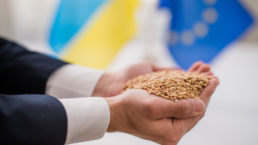The war in Ukraine and the food crisis it has compounded will result in growing poverty and privation.
By Tom Stevenson, London Review Of Books
Egypt’s Ministry of Supply is headed by Ali Moselhi, a former Mubarak crony whose career was resurrected in 2017 by the country’s current military ruler, Abdel Fattah el-Sisi. For weeks now Egyptian media have carried reports from Moselhi on how much wheat is left in the country’s permanent stores. Bulletins like these would normally be ignored as artefacts of the strange world of government communications (the Egyptian Ministry of Water Resources and Irrigation used to send me regular updates on the water level at the Aswan High Dam). But the most recent figure amounted to about eleven weeks of supplies. Egypt imports more wheat than any other state in the world. Declining grain reserves matter, since subsidised bread is the main method for averting mass starvation of the poor. This is not a unique situation. In its ‘strategic wheat reserve’, Saudi Arabia stockpiles enough for more than a year of bread-making – about 3.3 million tonnes. A lot of it is stored in massive silos just north of Buraydah, in the centre of the Arabian peninsula, surrounded by irrigation farms visible in satellite images as green crop circles dotting the hamada.

This may seem impressive, but Saudi reserves are tiny compared to the 650 million tonnes of grain which China has stored up. One site at Dalian, on the Liaodong Peninsula in the north-east, has 95 grain elevators, each a monument to hard memories of the mid-century famines. Until 1996 even the US, with its vast Midwestern farmlands, used to keep four million tonnes of wheat in reserve.
National grain supplies are an emotive subject: they are a test of the basic competence of the administrative state. An empty central granary once meant imminent political collapse. Russia’s invasion of Ukraine and US sanctions on Russia have severely disrupted grain exports from both countries. Between them, Ukraine and Russia produce about 15 per cent of the world’s wheat. The International Fund for Agricultural Development estimates that the area around the Black Sea is the source of 12 per cent of globally traded caloric intake. In addition, modern industrial farming is heavily reliant on hydrocarbons. As energy prices have risen so has the cost of fertiliser. The result has been a steep rise around the world in the price of all major staples except rice. Suddenly investment bank analysts are consulting soil fertility tables. Political commentators are paying attention to the UN Food and Agriculture Organisation’s food price index. It has been climbing since the summer of 2020, but April saw the third major jump in succession.
The price spikes are already having global effects. In March, Algeria restricted food exports. In April, flour mills in Kazakhstan were closed down thanks to a lack of cheap Russian wheat. In Turkey, inflation has hit 61 per cent and the price of food is rising even faster. The main producer of Indonesian instant noodles (19 billion packs per year) has warned of shortages.
Recent Posts
‘The Siege Must Be Broken’: Countries Called to Ship Fuel to Cuba After Trump Tariffs Struck Down
February 21, 2026
Take Action Now The US Supreme Court’s ruling “implies that Trump’s recent order imposing tariffs on countries selling oil to Cuba exceeds the…
Elite Depravity in Imperial Decline, A Zero Hour Conversation With Richard Wolff
February 20, 2026
Take Action Now “The system self-selects for psychopathy… the most sociopathically obsessive competitor and accumulator of personal power and…
Economics of Health For All: The Plan to Put Health at the Heart of the Global Economy
February 20, 2026
Take Action Now At the World Health Assembly in May, member states may endorse an unprecedented strategy declaring that health is not a cost – but…
The Left Owes a Lot to Jesse Jackson
February 19, 2026
Take Action Now As a movement builder, spokesperson, and candidate for the presidency, Jesse Jackson’s accomplishments were massive. He was one of…




